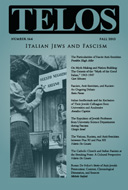The recent tripartite summit held in Thessaloniki in mid-June 2017 between the Greek and Israeli Prime Ministers and the Cypriot President to discuss energy- and security-related issues of the Eastern Mediterranean region, gave rise, again, to protests and strong reactions from the so-called political extremes against the visit of the Israeli Prime Minister to Greece. Within the context of the summit, the Greek and Israeli Prime Ministers also attended the official ceremony of unveiling a commemorative plaque for the planned Holocaust Museum in the city of Thessaloniki.
|
Writing in the journal Contemporary European History, Mia Lee reviews a group of recent books that focus on the historical connections between Nazism, the Muslim Brotherhood, and the rise of al-Qaeda. Included in the review is Matthias Küntzel’s Jihad and Jew-Hatred: Islamism, Nazism and the Roots of 9/11, published by Telos Press. Purchase your copy in our online store, and save 20% by using the coupon code BOOKS20. An excerpt from the review:
A panel on Renzo De Felice’s The Jews in Fascist Italy: An Historical Appraisal was held at the Calandra Institute on January 28, 2016. The panel included Frank Adler, Telos Editorial Associate and editor of Telos 164 (Fall 2013): Italian Jews and Fascism. Copies of Telos 164 can be purchased in our online store. Panelists explored the genesis of De Felice’s book and its place in contemporary historiography. Commissioned by the Union of the Italian Jewish Communities and published in 1961, it was the first study of the anti-Jewish persecution in Italy to reach a general audience. It was also a young historian’s first book on the Fascist era. This glance into a chapter of national history, that Italy had been quick to bury, set De Felice on a path to become one of the leading and most controversial scholars of Fascism. How was his attempt to capture an unsettling past received at the time of the book’s publication? What place does this book have in the current scholarship when many of its conclusions have been overturned after five decades of research on Italian state-sponsored anti-Semitism? And to which degree have the studies of Fascism and of the persecution of the Jews shed light on one another? Telos readers in the New York City area may be interested in an upcoming event at the John D. Calandra Italian American Institute: On the occasion of the paperback reprint of Renzo De Felice’s The Jews in Fascist Italy, this panel will explore the genesis of the book and its place in contemporary historiography. Commissioned by the Union of the Italian Jewish Communities and published in 1961, it was the first study of the anti-Jewish persecution in Italy to reach a general audience. It was also a young historian’s first book on the Fascist era. This glance into a chapter of national history, that Italy had been quick to bury, set De Felice on a path to become one of the leading and most controversial scholars of Fascism. An article by Hamid Dabashi recently appeared in the online version of the English-language edition of Al Jazeera. Dabashi teaches Iranian Studies and Comparative Literature at Columbia University, where the exiled Frankfurt School thinkers Max Horkheimer and Theodor Adorno found refuge during the period of National Socialism. Dabashi quotes Adorno’s 1949 thesis that it is barbaric to write poetry after Auschwitz and asks what it really means: “How could writing poetry after a calamity such as Auschwitz, and by extension a horror like the Holocaust, be something barbaric? Doesn’t poetry console in moments of mourning and despair?”
|
||||
|
Telos Press Publishing · PO Box 811 · Candor, NY 13743 · Phone: 212-228-6479 Privacy Policy · Data Protection Copyright © 2024 Telos Press Publishing · All Rights Reserved |
||||
 On Saturday, October 26, the Telos-Paul Piccone Institute and the
On Saturday, October 26, the Telos-Paul Piccone Institute and the 






